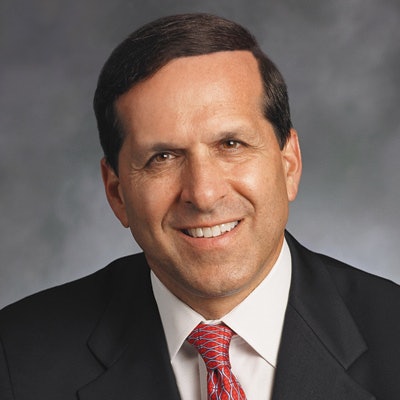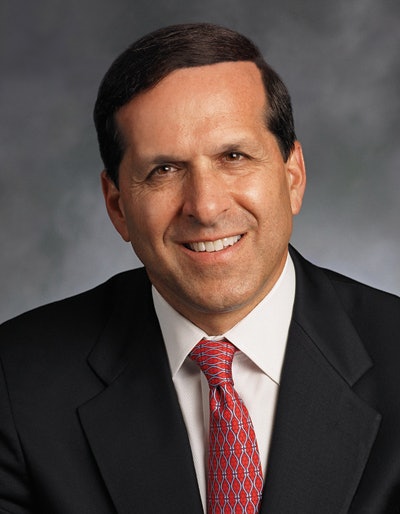
Dentists don't have the opportunity to attend courses in management, entrepreneurship, and team building. If we did, we would have been exposed to basic but essential concepts that included the practice's mission, core values, and vision. These three very clear concepts are far more important than they might seem. Many of the most successful dental practices in the U.S. use these concepts to formulate the foundation of what creates a superior dental team.
What your team really wants
 Dr. Roger P. Levin.
Dr. Roger P. Levin.The dental team members are no different than employees in many businesses in the sense that they have a similar desire. They want to be part of something bigger than themselves, have a purpose, and believe they are making a difference. Otherwise, your team members are simply working for a paycheck. They will do the job and get through the day, but they won't develop the sense of commitment and satisfaction that so many people value once it becomes part of their working lives.
Having a purpose creates a sense of meaning for a dental team member that goes beyond simply doing tasks such as setting up a clinical tray or filing insurance. It allows a person to move beyond a "moment-to-moment" focus and feel like he or she belongs to something. Further, it's the foundation to building a superior team, and it all begins with leadership.
The leader, usually the doctor, needs to establish the purpose of the practice and then communicate that purpose and exemplify it every day. The best way to create a cohesive superior team that follows a set of core values and principles is for the doctor or leader to live these values.
But before you can live them, you have to be able to identify them.
1. Develop a true mission
According to respected business authors, professors, and advisers such as Jim Collins, the author of Good to Great, the best companies have a very clear mission. The mission is your purpose. It should be simple, so be careful not to overcomplicate it. In fact, a mission should be communicated through a simple mission statement, no longer than two sentences.
We recently had a new client who was very proud of his mission statement. Unfortunately, it wasn't effective. It was one and a half pages, and when we interviewed team members and asked them about it, none had any idea what we were talking about. We worked with the doctor to reduce the mission statement to two sentences that captured the essence of the purpose of the practice.
The practice needed a mission statement that could be talked about often, used for decision-making, and memorized very quickly. A two-sentence mission statement is easy. A page and a half will quickly be forgotten.
So where do you begin? In writing your mission statement, take some time to put down several thoughts. It's OK to start with five, eight, or even 10 thoughts if they are all valid. You must then distill them into the most important few and turn those into one or two sentences.
As an example, Levin Group has a mission statement that has been our guiding force since 1985: It simply says, "Improving the lives of dentists." We talk about it often and make decisions based on this simple statement that can have powerful ramifications.
Once you establish your mission, it should never change.
2. Establish core values
Your core values should be no more than six values that you believe in. To put it simply, the core values are the DNA of the practice. And just as you can't change your DNA, you will never change your core values if you get them right from the start. You don't change your core values or violate them in good times, in bad times, or even during a pandemic. These are the values that will carry you through any situation and allow you to achieve your goals while creating a superior team.
Core values can include philosophies such as integrity, positivity, perseverance, innovation, quality, creativity, fun, and five-star customer service. Be careful not to pick ones that just sound good, but rather ones that you can really believe in.
As with your mission, it's essential to regularly discuss your core values. Simply writing them once, going through core values exercises, and having a great-looking list up on the wall isn't the real power behind core values. The power is using them regularly to discuss different situations, having the practice leaders reinforce them, and encouraging the team to live them. Gradually your team members will coalesce around the mission and core values, and they will take pride in the core values and the fact that they are living them.
Remember, your core values should never change.
3. Create a vision
Your vision is the answer to one question: Where do you want your practice to be in five years?
The vision is all about what you want to be, and five years is a manageable time frame to try to determine what you want to accomplish. Longer than that is difficult to predict. Do you want to acquire another practice, partner, associate, or team member? Should you add a new treatment room or technology? Do you need to outsource certain functions, improve management systems, or increase the number of new patients? The vision will be different for every practice, and it should be. The reality is that a vision is an individual business decision about where the doctors and owners want to go.
After you've figured out where you want the practice to go, you must plan how to get there. Strategic planning helps define the vision and find the steps of reaching it. Every practice should have a strategic plan and go through a planning process at least once a year.
Your vision can and will change.
Summary
If you implement a mission statement and core values and develop a five-year vision, you're giving people an opportunity to have a purpose, derive tremendous satisfaction from the job, develop a desire to remain with the practice, and feel that they are making a difference. This is what people truly want and that desire is increasing in the workforce today. If you want to build a superior team, this is the foundation.
Dr. Roger P. Levin is CEO of Levin Group, a leading practice management and marketing consulting firm. To contact him or to join the 40,000 dental professionals who receive his Practice Production Tip of the Day, visit LevinGroup.com or email [email protected].
The comments and observations expressed herein do not necessarily reflect the opinions of DrBicuspid.com, nor should they be construed as an endorsement or admonishment of any particular idea, vendor, or organization.



















